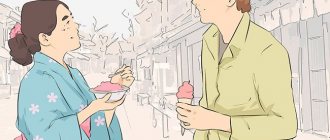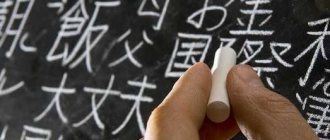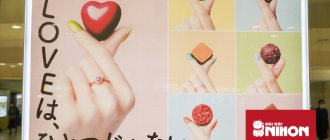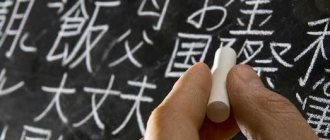If you're planning a trip to Japan and are desperate to find useful Japanese phrases, words and expressions that you can use right away, this is definitely the place for you! Even if you are not going to Japan, but are already learning Japanese, this selection of basic words will expand your vocabulary or, conversely, you will be able to make sure that you know some important words and phrases. Then this list is definitely for you! If you learn basic words and phrases in Japanese, you won't get overwhelmed when speaking.
When you're learning a new language, especially one that has a very different writing system than your native one, it can sometimes be difficult to learn the grammar and form a sentence right away. But don't worry! These expressions will help you share your feelings and thoughts without learning grammar.
These basic Japanese words and phrases will help you meet people, continue a conversation, or ask a question. These words are very common in everyday life, you will hear and use them all the time, be it a conversation with a teacher, studying new literature, or a trip to Japan. Therefore, you should know the basic words for 挨拶 (aisatsu: "greeting") and basic Japanese phrases.
Once you learn these words in Japanese, you will hear: めっちゃかっこい (matchya kakkoi: “very cool”).
Greetings for daily use
おはようございます ohayo:gozaimasu Good morning! A formal way to greet someone in the morning. You can use this greeting with colleagues, strangers or superiors. With friends and family, it is most often shortened to the form: おはよう! (ohai: morning!).
こんにちは!konnitiva hello! (or good afternoon)
This is a fairly formal greeting and not the way you greet friends and family. Used for strangers or in formal situations. But this is also the most common greeting. In written form it may appear as こんにちわ konnitiva. The meaning will not change, but still the first option is more correct.
今晩は!(こんばんは) kombanwa Good evening!
This is a formal greeting used in the evening.
お休みなさい!oyasuminasai Good night! When you wish good night to someone you are close to, you can shorten this saying by saying: おやすみ (oyasumi: night!)
良い天気ですね!iitenki desune! Good weather! いい (ii) means good and 天気 (tenki) means weather. So you can change い い to any other adjective that suits the day. This greeting is familiar to the Japanese.
元気ですか。Genkidesuka How are you? (How are you?) 元気 means “health” in Japanese, so you are asking if someone is healthy.
Greeting your friends and family with this phrase every time you see them is a little strange. And it is awkward to use the expression when addressing strangers (at the same time, strangers often nod and say nothing). This phrase is actually only used when enough time has passed since you have seen the person. This expression can also mean a wish for good luck. You can answer this phrase in different ways. For example, はい、元気です。Hai, genkidesu. 大丈夫です。Daijobudesu, if everything is fine, and vice versa いいえ、ちょっと悪いです。Iie, tottovaruidesu. No, not very good. (I'm sick, etc.)
久しぶり hisashiburi Long time no see! If you haven't seen someone for a week or more, you will hear the following phrase: 久しぶり! And it is logical to continue this statement with the question: 元気ですか。 じゃあ、また! Jia:, mata See you later! If, for example, you are about to leave work and say goodbye to your superiors, then use the word: さようなら sayo:nara. If you are in an informal setting, for example, about to say goodbye to friends, then じゃあ、また is a great way to say “see you later!” You can also use では、また deva, mata, which is a little more polite. じゃあ ね jia:ne - see you and じゃ、また明日 ね jia, mata asitane - see you tomorrow, these are also short friendly phrases for parting. ただいまtadaima I'm home! When someone returns home, this person says this phrase. And in response he hears: おかえりなさい!okaerinasai, which means: welcome back! You may also hear these phrases from colleagues at work.
行ってきますittekimasu I'm gone! This phrase is said to family, friends or colleagues when they say that
are about to leave. And in response they hear: いってらっしゃい itterassy Be careful! (Literally translated: go away and come back).
Everyday phrases
Itte kimasu
– Literally can be translated as “I left, but I’m going to come back.” Use when leaving home for work or school.
Chotto itte kuru
– Not a formal form, something like “I’ll go out for a minute.”
Itte irashai
- “Come back quickly.”
In response to " Itte kimasu".
Tadaima
- “I'm back” or “I'm home.” It is also used as a spiritual return home.
Okaeri nasai
– “Welcome home”, in response to
“Tadaima”
.
Okaeri
is not a formal option.
Itadakimasu
- pronounced before eating. Literally – “I accept [this food].” They often fold their palms as if in prayer.
Gochisousama deshita
- “Thank you, it was delicious.”
When finishing a meal. Another option is Gochisousama.
Everyday phrases in Japanese:
Simple question words in Japanese
What about nani? When traveling in Japan, you will encounter things that are unfamiliar to you, such as unusual food. To ask what it is, use the question word 何. Can be used alone or in a sentence if you are asking about something specific, for example, これは何ですか korewa nandesuka What is this? The most common question when meeting someone unfamiliar is: お名前は何ですか。O-namaeva nandesuka What is your name?
誰 who? If you're dating someone for the first time, you might want to find out who this person is. For example, 彼は誰ですか。Karewa daredesuka Who is he?
いつ itsu when? If a friend tells you that a sequel to your favorite show is coming out soon, you can ask いつ?, which translates to when. い つ can be used alone, depending on the context, or in a sentence.
どこdoko where? If you don't know where your friend is, then send him an SMS and ask: どこにいますか。Doko-ni imasuka Where are you?
いくら ikura how much? If you go shopping and don’t see a price tag on the product in the store, then you can ask the seller: いくらですか。Ikuradesuka. What is the price? どうして do:site why? Can be used on its own and as an interjection. This question word has several synonyms, but of all this is the most polite option. なぜ naze and なんでnande are used when talking with friends and family.
Sumimasen
This word will probably become one of your most used Japanese words because it can be used in several different contexts. It means "sorry" but can actually also mean "thank you" and "excuse me" when used to get someone's attention (for example, in a restaurant when you need to call the waiter).
There are so many situations when you can say it: when you get off a crowded train, when you ask someone for directions to a place you need, when you accidentally bump into someone in a supermarket, when you ask someone for a favor, when you apologize to someone.
For example:
Sumimasen , toire wa doko desuka?
Excuse me, where is the toilet?
すみません、降ります! Sumimasen, orimasu!
Excuse me, I'm getting off (on the train)!
Note that "sumimasen" is considered a mild apology, so it is not used to apologize for more serious offenses. For example, you wouldn't use it at work to apologize for not getting an assignment done on time.
Some cool Japanese phrases.
If you want your speech to be as close as possible to the native language, then this minimum vocabulary is for you!
よろしくお願いします。Yoroshikuonegaishimasu Nice to meet you. One of the first introductory phrases you may have already learned. Used when making acquaintances. When meeting new friends, you can shorten it to よろしくね yoroshikune.
頑張ってくださいgambattekudasai Try your best! (do your best) When a friend needs extra support, you can simply say 頑張って. This simple word means "Good luck" or "Do your best." And for business, formal situations, the option 頑張ってください is used.
おめでとうございます omedeto:gozaimasu Congratulations! Once your friend announces to you that he has passed the exam, congratulate him by saying おめでとう or more formally おめでとうございます. If he tells you that he passed the exam without mistakes, you can express your surprise with phrases such as マジ で? madzide? Indeed? or うそ ! uso! It can't be! (or you're lying!).
すごい!sugoi Wow! Marvelous! You can answer almost anything this way, it's a very common phrase. If you speak to a Japanese person in a native language, you will most likely hear this addressed to you. Conversely, if you want to say that something is terrible and not at all cool, then say: ヤバイ!yabai. However, this is a colloquial phrase; it can be used in dialogue with friends and family, but not in a formal setting. Otherwise you will be considered rude.
Hurray, you can now say a few basic words and phrases in Japanese. The Japanese words and expressions in this collection can go on and on! Don't just stop at these words, expand your vocabulary. Using these phrases, you can chat with new friends or show others that you are sincerely interested in learning Japanese. Just by including a few of these words in your conversation, you are sure to hear 日本語が上手ですね! Nihongoga jozudesune! You speak Japanese well!
If you don’t know the Hiragana alphabet yet, you can learn it in a quick way that we talk about in this article: read the article
Apologies
Gomen nasai
– “Excuse me, please”, “I beg your pardon”, “I’m very sorry.” A very polite form. Expresses regret for some reason, say, if you have to disturb someone. Often not an apology for a significant offense (unlike “sumimasen”).
Gomen
– Informal form of the same.
Sumimasen
- "I'm sorry". Polite form. An apology for committing a significant wrongdoing.
Sumanai/Suman
– Not very polite, male version.
Shitsurei shimasu
- "I'm sorry". Very polite formal uniform. Used, say, as “I’m sorry to bother you” when entering a superior’s office.
Shitsurei
– too, but less formally.
Moushiwake arimasen
- “I have no forgiveness.” A very polite and formal form, more often used in the army and in business.
Moushiwake nai
- not such a formal option.
Dozo
- "Ask".
A short form, an offer to enter, take an item, and so on. The answer is the already familiar “Domo”
.
Chotto... (Chotto)
- "No worries". Polite form of refusal. For example, if you are offered coffee.
Everyday phrases in Japanese:
Daijoubu desu 大丈夫です
Daiyoubu desu
is one of the most universal and important Japanese phrases in everyday life. Daijoubu means "okay" or "everything is fine", but in a separate context it can also be used to mean "yes" or "no".
A common scenario in which you might use this phrase is when you are in a supermarket and the clerk asks you something. For example, do you have a bonus card? If you don't have one, you can simply say "daijoubu desu" and the seller will understand that you mean "no".
Another common situation is confirming a reservation or appointment, such as a restaurant or doctor's appointment. They may ask if a particular time is right for you, to which you will respond, "Daijoubu desu" if the time is right.
You may ask "Daijoubu desuka?" to find out if everything is okay with a person. For example, if you are meeting someone but are running a little late, you can call or text them to say:
10分遅れます。大丈夫ですか? Sumimasen, juppun okuremasu. Daiyoubu desuka?
Sorry, I'll be 10 minutes late. Is everything okay (can you wait)?
You can also ask "Daijoubu desuka?" to check if the person is okay or feeling well. For example, if you see someone falling, you can ask them: "Daijoubu desuka?" Conversely, if you fall and someone asks you if you are okay, you can say, "Daijoubu desu!"
There are many ways to use this phrase, and there is no doubt that you will very quickly start using it in your daily life in Japan.
Going beyond the basics
Although these simple words and phrases are practical and useful, we strongly recommend that you still learn the language properly if you want to live and work in Japan. The best way to do this is to study in Japan and fully immerse yourself in Japanese society. You can read more about the benefits of learning Japanese using the full immersion method in our article here.
Or, if you can't come to Japan yet, you can also study the language online at Akamonkai, the largest Japanese language school in Tokyo. You can find out more about their course and our other online courses here.
Onegaishimasu & Kudasai お願いします & ください
Both of these words are important to know because they both mean “please.” For example, when you order at a restaurant or ask someone to make something for you, you say “ kudasai
” or “
onegaishimasu
” at the end.
“Onegaishimasu” is a more polite version, and sometimes they are used interchangeably. But there are also situations when you can only use one or the other option.
For example, at work it is better to use more polite language. So "onegaishimasu" would be more appropriate when you ask someone to give you something or do something for you.
However, it is common to use "kudasai" after a verb in everyday life, for example:
ちょっと待ってください。 Chotto matte kudasai .
Wait a little, please.
速ください。 Hayaku kudasai.
Please hurry up.










